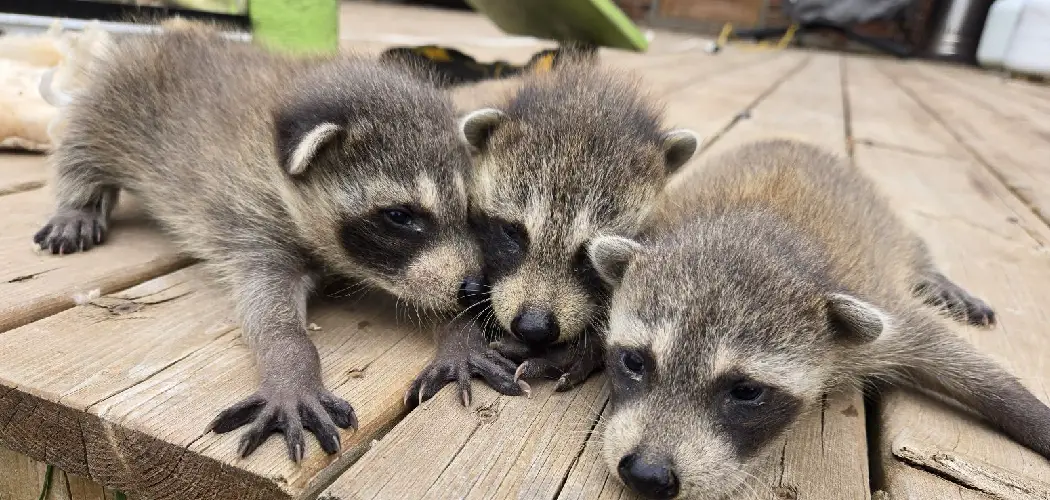Raccoons can be charming creatures to observe from afar, but when they invade your backyard, they can cause significant trouble. Known for their resourcefulness and curiosity, these animals often rummage through trash, damage gardens, and leave messes behind.
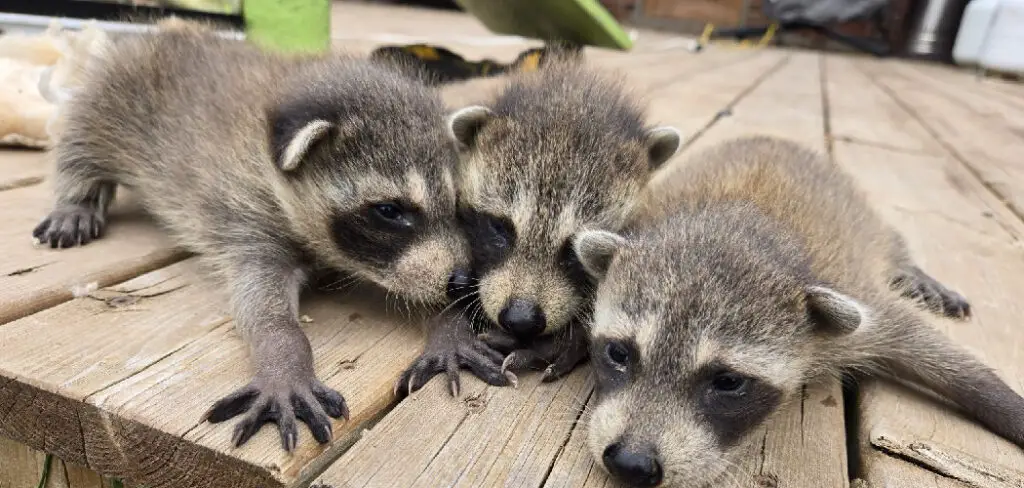
Keeping raccoons out of your backyard not only protects your property but also ensures their safety by preventing them from becoming too dependent on human-provided food sources. This guide aims to provide a clear and straightforward explanation of how to keep raccoons out of your backyard.
Why Raccoons Are Attracted to Your Backyard
Raccoons are naturally drawn to areas that provide easy access to food, water, and shelter. Your backyard may offer all three without you even realizing it. Trash cans with loose lids, leftover pet food, or fallen fruit from trees can serve as enticing snacks for these clever creatures.
Additionally, water sources like birdbaths or ponds make your property even more appealing. Dense vegetation, woodpiles, or sheds with small gaps can provide raccoons with ideal shelter where they feel safe. Understanding these attractions is the first step toward making your backyard less inviting to raccoons.
Signs of Raccoon Activity
Identifying signs of raccoon activity in your yard can help you address the issue early. Look for overturned trash cans or scattered garbage, as raccoons are known for rummaging through waste in search of food. Footprints with distinctive hand-like shapes, usually around mud or soft soil, are another telltale sign.
You might also notice damage to garden plants, as raccoons often dig in search of grubs or other insects. Scattered claw marks on tree trunks, fences, or even your home can indicate where the animals have climbed.
Additionally, raccoon droppings, which are often left near water sources or feeding areas, can confirm their presence. Staying alert to these clues can help you take proactive steps to manage raccoon activity effectively.
10 Methods How to Keep Raccoons Out of Your Backyard
1. Secure Garbage Cans and Compost Bins
Raccoons are primarily nocturnal scavengers, and nothing lures them in quite like an unsecured garbage can. To keep them at bay, start by using trash bins with locking lids or heavy-duty bungee cords that wrap around the lid and handles. Metal cans tend to work better than plastic, which raccoons can claw or chew through.
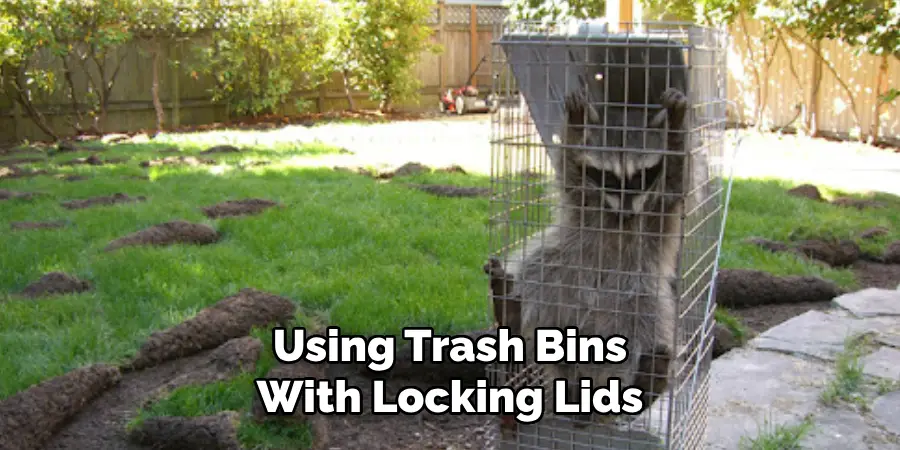
For added deterrence, store bins in a shed or garage until collection day if possible. The same rules apply to compost—always use a secure, enclosed bin and avoid composting meat, dairy, or oily food scraps, which are highly attractive to raccoons. Keeping your trash inaccessible is one of the most powerful ways to discourage nightly visits.
2. Remove Outdoor Pet Food and Bird Seed Overnight
If you leave pet food or bird seed outside, even just overnight, you’re offering a free buffet to raccoons. These clever animals are persistent and have excellent memories, meaning they’ll return repeatedly to any spot where they’ve found food. Always bring pet dishes indoors after feeding and use squirrel-proof bird feeders with trays or baffles to reduce spills.
Also, consider installing feeders high off the ground and removing them entirely at night. Even seed that’s fallen to the ground can attract raccoons, so regularly sweep under feeders. Cutting off these easy meals forces raccoons to look elsewhere for nourishment.
3. Block Entry Points Under Decks, Sheds, and Attics
Raccoons often seek out sheltered spaces to nest, and your backyard might be full of cozy hiding spots—especially under porches, decks, sheds, or in attic spaces. Inspect your property for any gaps, holes, or weak spots in siding or foundations. If you find an entrance raccoons could exploit, seal it with hardware cloth, heavy-gauge wire mesh, or wooden panels. Be sure no animals are inside before sealing—raccoons can be fiercely protective of their young. Preventing access to these warm, quiet areas helps ensure your yard doesn’t become a long-term raccoon residence.
4. Use Motion-Activated Lights or Sprinklers
Raccoons prefer darkness and stealth, so sudden bursts of light or water can startle and deter them. Installing motion-activated lights around your yard—especially near garden beds, trash bins, or the chicken coop—makes the area feel exposed and unsafe for raccoons.
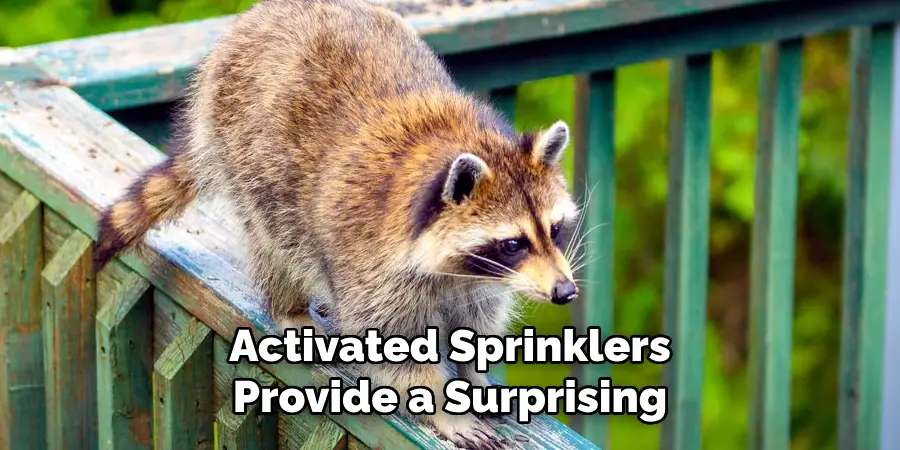
Alternatively, motion-activated sprinklers provide a surprising and harmless burst of water when triggered. These work especially well in gardens or near compost piles. The key is unpredictability—raccoons are intelligent and may adapt, so reposition devices periodically to keep them guessing and uncomfortable.
5. Eliminate Water Sources Where Possible
Raccoons not only seek food—they also look for reliable water sources. Pet water bowls left outside, birdbaths, leaky garden hoses, or shallow puddles can all attract them. During dry seasons, this draw becomes even stronger. Remove standing water each evening, fix dripping faucets or sprinklers, and empty decorative ponds or fountains if they’re not in use. If you keep birdbaths or pet bowls outdoors, bring them inside at night or use elevated, raccoon-resistant designs. The less access raccoons have to water, the less reason they have to frequent your backyard.
6. Install Fencing with Specific Raccoon-Deterring Features
Standard fencing might not be enough to deter raccoons, which are excellent climbers and surprisingly nimble. To build a raccoon-proof barrier, use fencing that’s at least 4 feet high and topped with a floppy overhang or roller bar that prevents climbing. You can also bury the bottom of the fence at least 6–12 inches deep to stop raccoons from digging underneath. If you want to protect a specific area like a vegetable garden or chicken coop, consider adding electric wire along the top (at a low voltage for humane deterrence). Creating physical barriers with thoughtful design significantly limits raccoon access.
7. Use Natural Scents and Repellents to Deter Raccoons
Raccoons have a strong sense of smell, which can be used to your advantage. Some natural substances—like ammonia, vinegar, garlic, or pepper—are offensive to raccoons and can serve as temporary repellents. Soak rags or cotton balls in ammonia or vinegar and place them near garden beds, trash bins, or known raccoon paths. Commercial raccoon repellents are also available and often contain predator urine, which can scare raccoons away. However, these methods require regular reapplication, especially after rain, and are best used alongside more permanent exclusion strategies.
8. Harvest Fruits and Vegetables Promptly from Gardens
Backyard gardens are a magnet for raccoons—especially if fruits, vegetables, or nuts are allowed to ripen and fall to the ground. Regularly inspect your garden and harvest produce as soon as it’s ripe. If raccoons discover a reliable food source, such as sweet corn, berries, or tomatoes, they’ll return nightly and can destroy plants in a single visit.
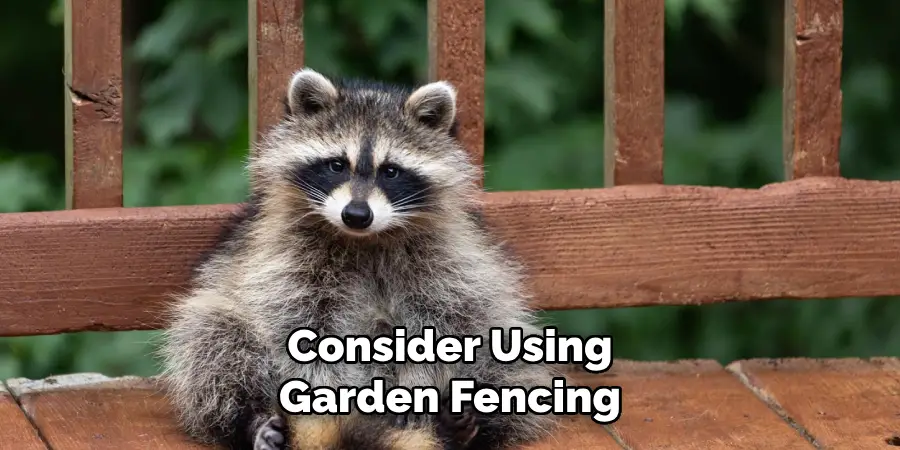
Consider using garden fencing or netting around particularly vulnerable plants. Raised garden beds with covers or hoop houses can also deter raccoons while protecting your plants from other critters like squirrels and birds.
9. Avoid Feeding Wildlife That Might Attract Raccoons
Feeding squirrels, deer, or stray animals can inadvertently invite raccoons. Any consistent food source that brings wildlife into your yard increases the likelihood that raccoons will follow. If you’re feeding outdoor animals for ethical reasons, try to do so during daylight hours and remove any leftovers immediately. Use feeders that limit access by weight or size, and keep feeding zones far from your home or vulnerable areas. While it may feel kind-hearted, feeding wild animals often disrupts natural behavior and encourages opportunistic scavengers like raccoons to invade.
10. Maintain a Clean, Uncluttered Yard
A messy yard offers both shelter and food for raccoons. Piles of firewood, tall grass, brush, unused patio furniture, or garden debris can provide perfect hiding spots. Keep your lawn trimmed, and remove any fallen branches, leaf piles, or overgrown vegetation where raccoons might nest. Store firewood at least 12 inches off the ground and away from fences or sheds. Also, clear fallen fruit from trees and clean up BBQ residue after outdoor cooking. A clean yard is less inviting to raccoons and makes your property easier to monitor for activity.
Safety Considerations
When dealing with raccoons, safety should always be a priority. Never attempt to handle or corner a raccoon, as they may become aggressive when they feel threatened. Raccoons can carry diseases such as rabies and leptospirosis, as well as parasites like raccoon roundworm. Always wear gloves and use protective gear when cleaning areas where raccoons have been active.

If you suspect a raccoon has entered your home or seems injured or sick, contact a professional wildlife removal service to handle the situation safely. Additionally, ensure pets are kept up-to-date on vaccinations and supervised while outside to reduce risks of encounters with raccoons.
Conclusion
Raccoons are resourceful, persistent, and highly intelligent animals—but with the right combination of deterrents, you can make your backyard an unattractive environment for them.
By securing food and water sources, blocking potential shelters, installing motion-based deterrents, and using natural repellents, you send a strong signal that your yard is off-limits.
Consistency and vigilance are key—raccoons quickly learn patterns, so mixing up your methods and staying ahead of their behavior will yield the best results. Thanks for reading, and we hope this has given you some inspiration on how to keep raccoons out of your backyard!

